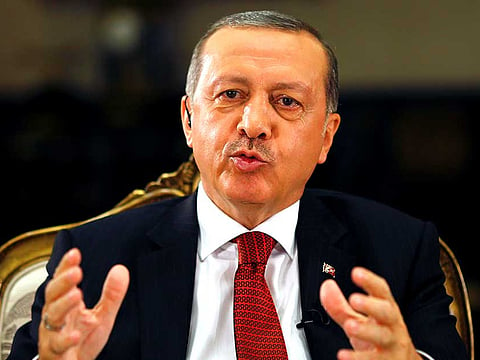Erdogan may cause more polarisation in Turkey
A successful uprising would have plunged the country into a prolonged crisis — and provided a boost for Daesh. Yet, the president seems to be stoking unrest

Of all the coverage of the attempted military coup against the government of Turkish President Recep Tayyip Erdogan, the many “what if”s have received hardly any scrutiny. For instance, if the coup had succeeded, the fallout would have been seismic for Turkey, the Middle East and the western security architecture — particularly Nato. Even die-hard opponents of Erdoan, including secularists and the Kurds, were vehemently opposed to the coup for fear of the unrest and instability it would have undoubtedly triggered at home and in the region.
The Turkish people do not have fond memories of four military interventions in Turkish politics in 1960, 1971, 1980 and 1997, which exacted a heavy toll on the Turkish state and society. If the uprising had succeeded, it would have been likely that the military would have suspended the democratic process in Turkey and brutally persecuted Erdoan and his allies, plunging the country into civil strife. The deep historical tensions that exist between Turkey’s military, which views its role as the guardian of the secular state, and Erdoan, whose Justice and Development Party (AKP) has its roots in moderate Islam, would have escalated into an all-out war. Entrenched in both Syria and Iraq, Daesh (the self-proclaimed Islamic State of Iraq and the Levant) and Al Qaida would have found a fertile breeding ground in yet another conflict zone.
Political instability in Turkey would have been a boon to Daesh terrorists. With a pivotal role in the conflicts in Syria and Iraq, and as a partner in the United States-led coalition against Daesh, Turkey’s descent into the unknown would have destabilised the Middle East further. The return of the military to Turkish politics would have been music to the ears of strongmen in Syria and Egypt and to anti-Islamist governments in the region and beyond. Erdoan’s fall would also have delivered a shattering blow to the rebels in Syria, who depend on Turkey for arms and money.
Syrian President Bashar Al Assad would have been a happy man had Erdogan, his bitter nemesis, been overthrown by the generals, tipping the scales in his favour. Although the Erdogan government has only recently joined the US-led coalition against Daesh in Syria, Turkey’s role is vital because of its proximity to the theatre of operations, as has been acknowledged by American officials. Turmoil in Turkey would have probably put an end to the country’s participation in the fight to expel Daesh from Raqqa, the group’s de facto capital and a base for plotting attacks worldwide. More importantly, the 2.7 million Syrian refugees in Turkey would have most likely been the first casualty of the coup. Cutting a deal with Al Assad, the generals would have sent the refugees home.
The US would have found it difficult to collaborate with a regime that had toppled a democratically-elected government. The administration of US President Barack Obama would have found it extremely difficult to collaborate with a military-based regime in Ankara that had toppled a democratically-elected government — especially in a bulwark of Nato’s eastern flank that has the second-largest army in the organisation after the US. Turkey’s membership of Nato would have been suspended, a decision that carries strategic repercussions for the western security alliance.
For all these reasons, the opposition in Turkey put aside its fierce political disagreements with Erdogan and fully supported the country’s democratic institutions. Although the coup exposed deep ideological fault lines in Turkey, the nation coalesced around the constitution, legality and separation of powers. Erdogan could have used this historic moment as a catalyst for national reconciliation and to put an end to the erosion of democracy. His secular and Kurdish political enemies have shown moral courage, civil responsibility and commitment to the rule of law. Sadly, Erdogan appears to be drawing the wrong lessons, seeing the uprising as a “gift from God” to “cleanse our army”. In the past few days, the president has gone further by launching what appears to be a counter-coup to “cleanse all state institutions” of those deemed disloyal to him.
More than 50,000 people have been arrested, dismissed or suspended from their jobs — including judges, prosecutors, teachers, university deans and journalists. Some 15,200 public education employees and 21,000 teachers working in private education institutions have been suspended and are being investigated for possible links to Turkish cleric Fethullah Gulen, who resides in the US. Erdogan has accused Gulen, a long-time bitter rival, for being the driver behind the attempted coup, without providing conclusive evidence. The scope of the purge is causing alarm in Turkey and western capitals, although the Erdogan government has dismissed warnings and threatened to reintroduce the death penalty.
Instead of being guided by the rule of law and the spirit of justice, Erdogan is driven by fear, vengeance and the desire to concentrate power in his own hands. His actions and populist rhetoric are likely to cause even more polarisation and division in Turkey. Had the coup succeeded, Turkey would have descended into a prolonged period of chaos. Nevertheless, the failed uprising has threatened further erosion of democracy in the country — a tragedy that could still be averted. It all depends on Erdoan now, whose popularity has soared after the coup, for showing leadership and vision. The signs are not encouraging after Erdoan declared a three-month state of emergency that gave him extra powers to pursue his real and perceived enemies.
— Guardian News & Media Ltd
Fawaz A Gerges is professor of the Middle East at the London School of Economics and author of ISIS:A History.
Sign up for the Daily Briefing
Get the latest news and updates straight to your inbox



